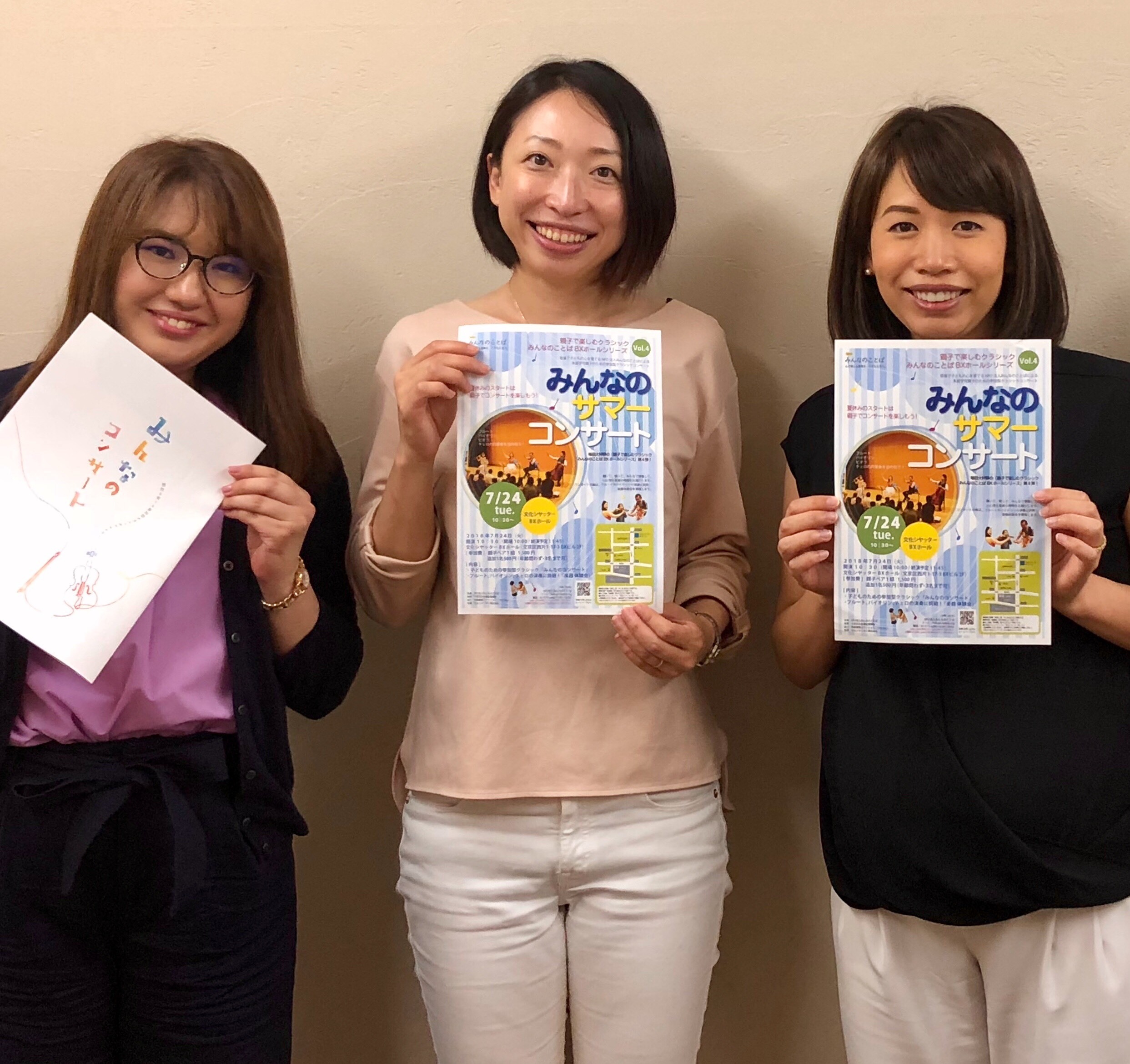Minna No Kotoba
“Minna No Kotoba” was chosen as one of our 2017 beneficiaries. Their focus is to inspire all 5 senses of children up to 6 years of age through “Minna No Concert” (a program where children can fully experience classical music). We interviewed Yuko Watanabe, the Representative Director of Minna No Kotoba.

From left to right, Ms. Ayaka Nogaku (FIT Communications Team), Ms. Yuko Watanabe (Representative Director) and Ms. Akiko Sagawa (FIT Communications Team).
FIT: What was the motivation behind starting this program?
Watanabe: I was an intern whilst at university where I coordinated events and music for weddings. It was a 3-month program and although it was my first job, I enjoyed it so much that I then did it for another year as a part time job. One day the CEO of the company said “I am going to quit this company and start a new one. Is anyone interested in being my successor?” Being young and fearless, I took the opportunity, and soon found myself struggling for the next 4 years.
My job was to coordinate musicians, which provided the satisfaction of live and vibrant music, as opposed to BGM (background music). One day, to my surprise, I brought live musicians to a pre-school, and the kids reacted very positively. I was able to see them react to “live” music that flows from “real” instruments, not from TV. The change in their facial expressions, the “wows” (an expression one has when they just had a life changing experience) made me think there is something far more fulfilling that live music can bring compared to BGM.
One day I came across a slogan in a newspaper: “a child who holds an instrument, will not hold a weapon.” This slogan was presented by the president of Colombia at the time, Ulivieri, who thought increasing music exposure would lead to a safer and more peaceful country. His words made me realize that music can be a tool to communicate, and despite the difference in languages, eye colours, skin colours, that in the long run, music will bring peace as long as they play the same tune. The positive change of expressions I saw in the children through live music, added with the peace live music brought, I then knew I had to be the one to make it happen.
FIT: I see that your goal was set then and there. How was it after that?
Watanabe: Straight off the bat, I hit a wall. The company was a for-profit organisation and I was working as a sales representative targeting pre-schools. However I was told there they did not have budget to invite musicians, but only volunteer workers, so I organised and invited them to a free concert, backed by sponsors. Seats were filled instantly, and I saw first hand how parents wanted their kids to have exposure to such events. The fundamental issue that classical concerts had was that children were not allowed to enter, and many schools did not have the budget.
About 10 years ago I left the company, and with the help of sponsors I started an NPO that aims to provide live music to children.
FIT: How did you get over the budget issues after starting the NPO?
Watanabe: I thought that once I became an NPO, that I would be able to get the budget I needed. I was wrong. Until this day, I am still struggling with it. My success with the free concerts in my previous job made me feel optimistic about receiving funding, especially after becoming an NPO, but things did not go smoothly. Back in 2009, partly due to Global Financial Crisis, nothing went as planned. Sponsors and Corporations were requesting the merits and impact of their funding in various metrics. It was, and still is, the hardest part to provide to them in a meaningful way.
I have always thought on how to deliver music that moves children. I have been exposed to so many types of live music, and I know the variety comes in so many different colours. The grandiose orchestra that plays in a big hall is spectacular, but to deliver that music to children, you need to think about the distance from the children, the musical composition, and the structure of the program. Given these constraints, it ends up best to host it as a small concert. This does not provide as much benefit for the Sponsors who seek larger publicity, and that is why I am very thankful to FIT who understands this and has chosen to sponsor us.
FIT: Is it also hard for you to find musicians then?
Watanabe: We interview them and select them carefully. Other than being at a certain quality, they need to understand and share our feelings towards the children, and be able to deliver the message through their music. This is really about suitability. We interview freelancers, audition them, and have them go through orientation to make sure they are suitable for the children. We also need to compensate them enough so that they will prioritise our offer over others.
FIT: Please let us know what FIT charity fund will be used for.
Watanabe: We would like to hold concerts for children with developmental disorders under 6 years of age. The reason being that, say an adult sense is matured 100% by age 20, it is said that by the age of 6 you would have matured 80%. We want the children to be able to experience through their 5 senses and be able to express themselves. We need to have them feel something, i.e. having them touch something cold and have them express “wow, it is cold!”, and we need to be there to positively re-enforce it by saying, “you’re right, it IS cold!”
Children these days are exposed to reality virtually (through TV and internet) rather than through real life. What we want to do is to try and create a familiar environment for the children by visiting them, and have them listen to the music in any way they want instead of making them sit down, and have them express what they feel, freely. They may cover their ears, sing along, or even dance along. When kids approach us with that “It’s so much fun!” face, we positively re-enforce them by responding “Yes! It’s so much fun, isn’t it!!” Our program is structured so that children can have as many of these reactions as possible.
FIT: How do you think children exposed to these concerts will grow up?
Watanabe: Many kids learn some sort of musical instrument. But our goal is not to increase the number of children learning an instrument. We want to have them open up to more opportunities by being able to accept, enjoy, and nurture what they have currently into something much bigger. This is the reason why it is so hard for me to express any of these details in statistics. We would love to see what these children become in the future as a result of our program.
FIT: What is your dream?
Watanabe: To provide concerts to ALL children in pre-school. When I say all, I include everyone, not just those with developmental disorders or those who are economically challenged. I believe there is not only an income gap nowadays, but an experience gap. It does not matter whether you have a budget or not, or what you family situation may be, we all should have the same yearly events (i.e. picnics, etc). My dream is to provide live concerts for all children.
FIT: Lastly, a message to those who are going to participate in FIT.
Watanabe: A thank you from the bottom of my heart. As mentioned before, it is extremely hard for me to get sponsors, and I am honoured to be chosen this year. FIT has a great goal, and I want all those who participate to know that we have been greatly supported by them, and hope they keep up their spirit / support forever. Thank you very much.
Minna No Kotoba http://www.minkoto.org/

